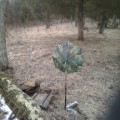Who coined the silly term "hung up" ?
From Turkey and Turkey Hunting:
ORIGINAL: TurkeyComander
Who coined the silly term “hung up” ?
I really don’t think it’s silly, but I do think it is oftentimes a solvable state. At least it is something that was in your control at some point. It certainly is not a disease. If nothing else it is a ready excuse for the uninitiated (“I dunno, the gobbler just got hung up!”)
Let’s look at the basic idea of a hung-up gobbler. A gobbler is on his way to you and at some point he just stops coming. He’ll honor calls, but he comes no closer. At some point after this, he drifts off. Several things can explain this:
1) One answer is a hen came in and attracted the gobbler’s attention away from you. I’ve also seen it happen where another caller attracted the gobbler. It happens. If you can’t hear the other hen calling, you have no idea what is going on. I’ve had this happen on crowded hunting land. The only way you know it was a hunter is when the other shotgun goes off.
2) There is no tried and true formula for taking a turkey’s temperature. However, if you misread the gobbler, the result can be a hang-up. Call too light, and he loses interest. Call too aggressively, and he gets hinky. You have to be just right. I think it is this reason that would lead some experienced hunters to poo-poo the idea of a hung-up gobbler. Correctly assessing a gobbler is an art; recovering from a misread is even more of an art. However, any fellow on this forum that claims he’s mastered it is fooling himself or you or both. If he’s truly mastered it, he’s out on the circuit and he’s not on this forum.
3) The most common and most accessible reason for a hang-up is right in your hand. If you have a gobbler coming in, don’t call just to see how far he’s come in the last minute or two. That’s a sure ticket to a hang-up. The gobbler has to stop and gobble. Chances are he’s also going to go into his strut, and it will take him a while to realize you’re not coming to him and he has to keep coming to you. I’ve called in gobblers that have taken over an hour and one that took 3 hours to come in. I’ve also watched a gobbler come across acres of open pasture.
Whenever I called, he stopped gobbled and strutted. When hens yelped off in the woods, he stopped, gobbled and strutted. Whenever the wind blew just right, he stopped gobbled and strutted. Each time, he expected a hen to emerge and run over to him and put her breast down in the grass and stick her butt up in the air and beg softly. I personally think some of these gobs get so worked up in their hen fantasies they pop off and go off searching for a cigarette. They at least slink off in shame. I don’t want to prove that assertion, but I pity the poor graduate student that tries to do the research.
4) The last reason for a hang-up is the most ignominious. The gobbler came in and busted you, and ran off. Here again, you don’t know. Your gun barrel moved, he caught the motion, figured out the situation and he was gone. He may not even be sure himself. He may or may not putt, but he’s withdrawn to a distance where he feels safe. It may not even be your fault. He may have just come in far enough to figure out there was no hen and that was enough. The situation may be salvageable, but the game has gone sour in a big way.
You may agree with these 4 points or not. There may be others. It just was a list I came up with before I had to leave to take the kid to school. The important thing I want ya’ll to take away from this is that we need to maintain the concept of the hung-up gobbler. It is an important concept. It helps to maintain the sport. Dads need this as a ready explanation for their sons.
“Why did the gobbler stop coming, Dad?”
“I dunno. Maybe he heard you fidgetting and he hung up.”
or
“How did you two do today?”
“Oh, we had a nice gobbler coming in, but he hung up. Right, Dad?”
This post has already been read 399 times!
Views: 1









Comments
Who coined the silly term "hung up" ? — No Comments
HTML tags allowed in your comment: <a href="" title=""> <abbr title=""> <acronym title=""> <b> <blockquote cite=""> <cite> <code> <del datetime=""> <em> <i> <q cite=""> <s> <strike> <strong>